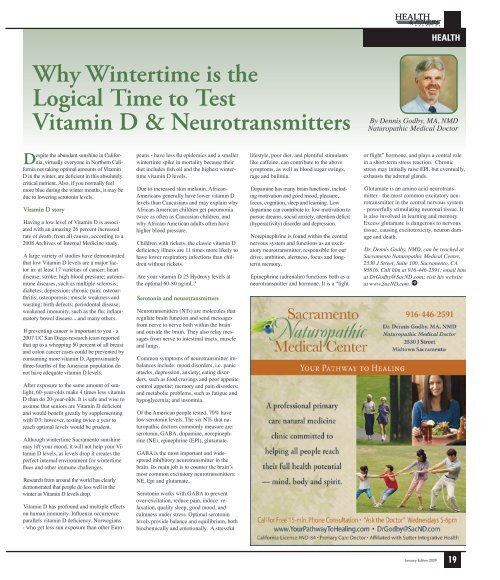How Happy Are Your Feet? - Health & Fitness Magazine online!
How Happy Are Your Feet? - Health & Fitness Magazine online!
How Happy Are Your Feet? - Health & Fitness Magazine online!
You also want an ePaper? Increase the reach of your titles
YUMPU automatically turns print PDFs into web optimized ePapers that Google loves.
HEALTH<br />
Why Wintertime is the<br />
Logical Time to Test<br />
Vitamin D & Neurotransmitters<br />
By Dennis Godby, MA, NMD<br />
Naturopathic Medical Doctor<br />
Despite the abundant sunshine in California,<br />
virtually everyone in Northern California<br />
not taking optimal amounts of Vitamin<br />
D in the winter, are deficient in this absolutely<br />
critical nutrient. Also, if you normally feel<br />
more blue during the winter months, it may be<br />
due to lowering serotonin levels.<br />
Vitamin D story<br />
Having a low level of Vitamin D is associated<br />
with an amazing 26 percent increased<br />
rate of death, from all causes, according to a<br />
2008 Archives of Internal Medicine study.<br />
A large variety of studies have demonstrated<br />
that low Vitamin D levels are a major factor<br />
in: at least 17 varieties of cancer; heart<br />
disease; stroke; high blood pressure; autoimmune<br />
diseases, such as multiple sclerosis;<br />
diabetes; depression; chronic pain; osteoarthritis;<br />
osteoporosis; muscle weakness and<br />
wasting; birth defects; periodontal disease;<br />
weakened immunity, such as the flu; inflammatory<br />
bowel disease....and many others.<br />
If preventing cancer is important to you - a<br />
2007 UC San Diego research team reported<br />
that up to a whopping 50 percent of all breast<br />
and colon cancer cases could be prevented by<br />
consuming more vitamin D. Approximately<br />
three-fourths of the American population do<br />
not have adequate vitamin D levels.<br />
After exposure to the same amount of sunlight,<br />
60-year-olds make 4 times less vitamin<br />
D than do 20-year-olds. It is safe and wise to<br />
assume that seniors are Vitamin D deficient<br />
and would benefit greatly by supplementing<br />
with D3; however, testing twice a year to<br />
reach optimal levels would be prudent.<br />
Although wintertime Sacramento sunshine<br />
may lift your mood, it will not help your Vitamin<br />
D levels, as levels drop it creates the<br />
perfect internal environment for wintertime<br />
flues and other immune challenges.<br />
Research from around the world has clearly<br />
demonstrated that people do less well in the<br />
winter as Vitamin D levels drop.<br />
Vitamin D has profound and multiple effects<br />
on human immunity. Influenza occurrence<br />
parallels vitamin D deficiency. Norwegians<br />
- who get less sun exposure than other Europeans<br />
- have less flu epidemics and a smaller<br />
wintertime spike in mortality because their<br />
diet includes fish oil and the highest wintertime<br />
vitamin D levels.<br />
Due to increased skin melanin, African-<br />
Americans generally have lower vitamin D<br />
levels than Caucasians and may explain why<br />
African-American children get pneumonia<br />
twice as often as Caucasian children, and<br />
why African-American adults often have<br />
higher blood pressure.<br />
Children with rickets, the classic vitamin D<br />
deficiency illness are 11 times more likely to<br />
have lower respiratory infections than children<br />
without rickets.<br />
<strong>Are</strong> your vitamin D 25 Hydroxy levels at<br />
the optimal 60-80 ng/mL?<br />
Serotonin and neurotransmitters<br />
Neurotransmitters (NTs) are molecules that<br />
regulate brain function and send messages<br />
from nerve to nerve both within the brain<br />
and outside the brain. They also relay messages<br />
from nerve to intestinal tracts, muscle<br />
and lungs.<br />
Common symptoms of neurotransmitter imbalances<br />
include: mood disorders, i.e. panic<br />
attacks, depression, anxiety; eating disorders,<br />
such as food cravings and poor appetite<br />
control appetite; memory and pain disorders;<br />
and metabolic problems, such as fatigue and<br />
hypoglycemia; and insomnia.<br />
Of the American people tested, 70% have<br />
low serotonin levels. The six NTs that naturopathic<br />
doctors commonly measure are:<br />
serotonin, GABA, dopamine, norepinephrine<br />
(NE), epinephrine (EPI), glutamate.<br />
GABA is the most important and widespread<br />
inhibitory neurotransmitter in the<br />
brain. Its main job is to counter the brain’s<br />
most common excitatory neurotransmitters:<br />
NE, Epi and glutamate.<br />
Serotonin works with GABA to prevent<br />
over-excitation, reduce pain, induce: relaxation,<br />
quality sleep, good mood, and<br />
calmness under stress. Optimal serotonin<br />
levels provide balance and equilibrium, both<br />
biochemically and emotionally. A stressful<br />
lifestyle, poor diet, and plentiful stimulants<br />
like caffeine, can contribute to the above<br />
symptoms, as well as blood sugar swings,<br />
rage and bulimia.<br />
Dopamine has many brain functions, including<br />
motivation and good mood, pleasure,<br />
focus, cognition, sleep and learning. Low<br />
dopamine can contribute to: low motivation to<br />
pursue dreams, social anxiety, attention deficit<br />
(hyperactivity) disorder and depression.<br />
Norepinephrine is found within the central<br />
nervous system and functions as an excitatory<br />
neurotransmitter, responsible for our<br />
drive, ambition, alertness, focus and longterm<br />
memory.<br />
Epinephrine (adrenalin) functions both as a<br />
neurotransmitter and hormone. It is a “fight<br />
or flight” hormone, and plays a central role<br />
in a short-term stress reaction. Chronic<br />
stress may initially raise EPI, but eventually,<br />
exhausts the adrenal glands.<br />
Glutamate is an amino acid neurotransmitter<br />
- the most common excitatory neurotransmitter<br />
in the central nervous system<br />
- powerfully stimulating neuronal tissue. It<br />
is also involved in learning and memory.<br />
Excess glutamate is dangerous to nervous<br />
tissue, causing excitotoxicity, neuron damage<br />
and death.<br />
Dr. Dennis Godby, NMD, can be reached at<br />
Sacramento Naturopathic Medical Center,<br />
2530 J Street, Suite 100, Sacramento, CA<br />
95816. Call him at 916-446-2591; email him<br />
at DrGodby@SacND.com; visit his website<br />
at www.SacND.com.<br />
January Edition 2009<br />
19









